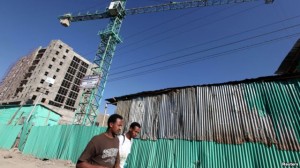 Young members of the Ethiopian diaspora are returning in large numbers to their country of birth. The Ethiopian government welcomes the impact these returnees could have on the economy.
Young members of the Ethiopian diaspora are returning in large numbers to their country of birth. The Ethiopian government welcomes the impact these returnees could have on the economy.
The government is well aware of the trend. The director of the Diaspora Office in the Ministry of Foreign Affairs, Feisel Aliyi Abrahim, says that investment by the returnees is very important.
“They are our development partners, we need them and also they need us because of they do business here they also benefit, the return is very high. And we need them because they bring us knowledge, they bring us technology, they bring us foreign direct investment, they create jobs, so this overall has very significant role in reducing poverty,” he said.
Ethiopia is one of the fastest growing economies in the world. Most cafes in the capital of Addis Ababa that offer free Internet connections are filled with young returnees working on their laptops. Samuel is one of them. He is a 32-year-old graphic designer who spent most of his life abroad before coming back to Ethiopia seven months ago to see if he could start a career.
“It was a struggle at first, but now its been picking up a few plans here and there. And it’s ok, its ok, it’s getting better, there’s enough opportunity. I haven’t decided if I’m planning to stay yet, but I’m optimistic so far,” he said.
Nardi is another Ethiopian who just moved back from the U.S. state of Texas. The 27-year-old pharmacist hopes that her skills will benefit her country.
“I’m not sure exactly how I can apply my professional experience in the country because its very different from what I’m used to. The field is different here, the setup is different, even the degree is different. I would like to start a business where I can help my country as well as myself grow. But I want to do something in pharmacy,” she said.
Many returnees have already started new businesses. Lily Kassahun, who lived in Canada for the last 20 years, is opening a restaurant with Canadian dishes this month in Addis Ababa. She says her decision to return was not just about economic opportunities.
“I always wanted to come back to Ethiopia to learn more about my culture since I left when I was younger. Also to be with my family, it was the biggest goal for me. More so than the money I think it’s more about feeling good and giving back to the community, and bring what I learned in Canada here,” she said.
The total investment capital of the returnees is an estimated $1.1 billion. That’s almost as much as the $1.4 billion Ethiopia received last year in remittances. But investment is more important in the long run says Feisel.
“Both is important but we need investment, that is more important because its increases the development,” said Feisel.
The most popular industries among the returnees are real estate development, manufacturing, construction, and the tourism and hotel industry. About 3,000 members of Ethiopia’s diaspora have returned for investment purposes. Feisel says that nowadays they are involved in every sector.
“There is not any field that they haven’t been involved in so far. And from the Ethiopian government side, because they are originally Ethiopians, we make legal arrangements that enables them to invest to do business in every sector they are interested in,” he said.
Mikhayel Tesfaye is a 36-year-old designer and CEO of a California-based company called Passport ADV. He started manufacturing his shoes in Ethiopia last year.
“My business was doing quite well, and I was at point where I just said that this was my one opportunity to stop what I was doing outside, for one year I will take the risk for just trying, with no expectations, no demands,” he said.
Mikhayel will export 900 shoes in the coming months, mainly to North America, Europe and Japan. His shoes are produced in a factory in Addis Ababa with new and modern machinery, mainly from Italy.
Exchanging knowledge, ideas
and skills is important for Mikhayel as he feels it could have a long lasting impact.
“I didn’t come here to create a charity project for one. Two, not only do I want to design a good product, but I want to raise the bar. Not only for what is capable here but for the outside world, what they believe is capable. I’ll be producing $1,000 pairs of crocodile sneakers here. I think because of the level of distribution that I already have, that I’ll really be able to put made in Ethiopia products on the map,” he said.
Feisel says that the government is actively working on making life easier for returning diaspora.
“What we are doing now is we are drafting Ethiopian diaspora policy. We try to create awareness to all government structures who has direct relation with the diaspora engagement,” he said.
The first draft of Ethiopian diaspora policy will be sent to the federal government in the coming weeks for approval. – VOA
by Marthe Van Der Wolf
– October 05, 2012